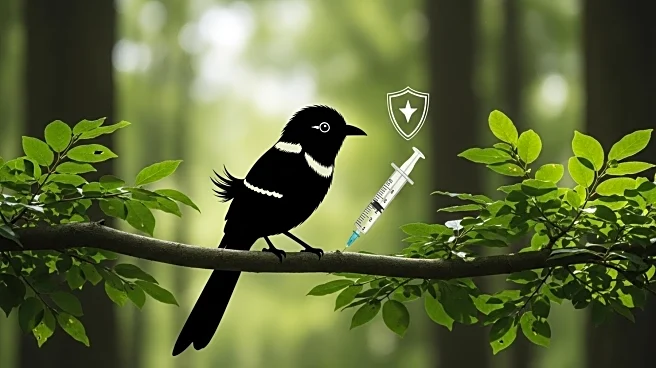What's Happening?
New Zealand's Department of Conservation has completed a groundbreaking research trial to vaccinate some of its rarest bird species against avian flu. The trial involved vaccinating up to 10 captive birds from five critically endangered species, including the kākāpō and takahē, using the H5N3 poultry vaccine. The initiative is part of a global effort to protect wildlife from the H5N1 strain of bird flu, which has caused mass deaths among various animal populations worldwide. The trial demonstrated that four species developed a strong antibody response lasting at least six months, offering hope for protecting these birds as migration season approaches.
Why It's Important?
The vaccination program is crucial for preserving New Zealand's unique biodiversity, as the country is home to nearly 100 bird species found nowhere else. With avian flu circulating globally, the initiative could prevent the extinction of species already on the brink. The success of this trial could serve as a model for other countries facing similar threats, highlighting the importance of proactive measures in wildlife conservation. The program also underscores the need for strategic planning in deploying vaccines to protect vulnerable populations effectively.
What's Next?
New Zealand plans to develop a deployment strategy for the vaccine before the spring migration season, when the risk of avian flu introduction increases. The program's timing will depend on assessments of when the virus might reach the country's shores. Other countries, including Australia, are closely monitoring the trial results and conducting their own research to prepare for potential outbreaks. The initiative may lead to broader discussions on the feasibility and ethics of vaccinating wild animals for conservation purposes.
Beyond the Headlines
The trial raises questions about the logistics and ethics of vaccinating wild animals, as incomplete vaccination could lead to more potent viral strains. The program also highlights the challenges of maintaining up-to-date vaccines for wildlife, given the rapid evolution of viruses. The initiative reflects a growing recognition of the interconnectedness of human and wildlife health, emphasizing the need for comprehensive strategies to address emerging infectious diseases.










